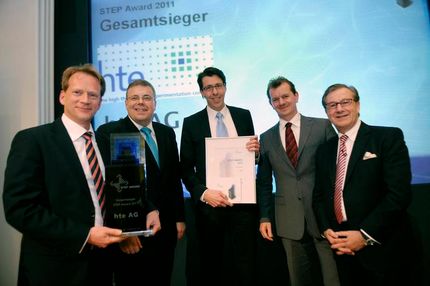Professor Pierre Jacobs receives Alwin Mittasch Special Prize
Bridging the gap between basic research and industrial application
Professor Dr. Pierre Jacobs, KU Leuven (Belgium), has received the BASF-DECHEMA Alwin Mittasch Special Prize for his research into materials and their use as process catalysts. The award, which comes with €10,000 in prize money, was presented at the “Future Loves History – 100 Years of Ammonia Synthesis” scientific symposium at BASF in Ludwigshafen.
“Professor Jacobs has succeeded in a special way in spanning the bridge between basic research and industrial application,” said Professor Rainer Diercks, President Petrochemicals BASF and Chairman of DECHEMA. Initially focusing on zeolites and their use in catalysis, Pierre Jacobs gradually expanded his research activities to include other heterogeneous and homogeneous catalytic processes. Many of his research insights are now in industrial use. These include synthesis of g -butyrolactone from maleic acid anhydride, an important step in the manufacture of anti-dementia drugs, and side chain alkylation of alkyl-substituted anthraquinones, an intermediate step in industrial hydrogen peroxide production. His research areas also include catalytic processing of biomass.
DECHEMA confers the Alwin Mittasch Prize usually every three years. This year BASF sponsored a special prize to mark the 100th anniversary of the commissioning of the first ammonia plant in September 1913. “Without the enormous efforts of catalyst research, the Haber-Bosch process for ammonia production would never have been transferred to industrial scale and this world would be a different place,” Dr. Peter Schuhmacher, President Process Research and Chemical Engineering said. “For that reason, it was a matter of great importance to us to present the award to someone who is continuing Alwin Mittasch’s legacy.”
Pierre A. Jacobs was born in 1943. After completing his studies at the University of Leuven, he went on to specialize in the development of materials for catalytic processes in every area of chemistry. He has taught at the Dutch Institute of Catalysis Research and as a visiting professor at ETH Zürich. The numerous awards he has received for his work include the 1981 American Chemical Society's Emmett Award in Fundamental Catalysis, the Donald W. Breck Award in 1998 and the Synetix Award of the European Federation of Catalysis Societies in 2001.
Other news from the department science
Most read news
More news from our other portals
See the theme worlds for related content
Topic world Synthesis
Chemical synthesis is at the heart of modern chemistry and enables the targeted production of molecules with specific properties. By combining starting materials in defined reaction conditions, chemists can create a wide range of compounds, from simple molecules to complex active ingredients.

Topic world Synthesis
Chemical synthesis is at the heart of modern chemistry and enables the targeted production of molecules with specific properties. By combining starting materials in defined reaction conditions, chemists can create a wide range of compounds, from simple molecules to complex active ingredients.


























































